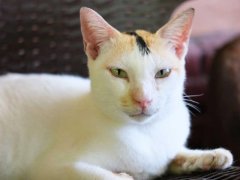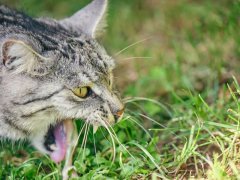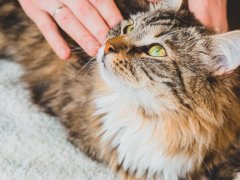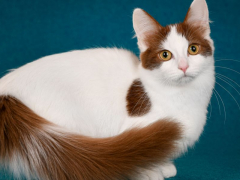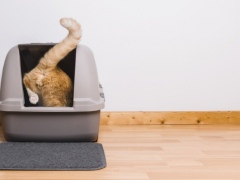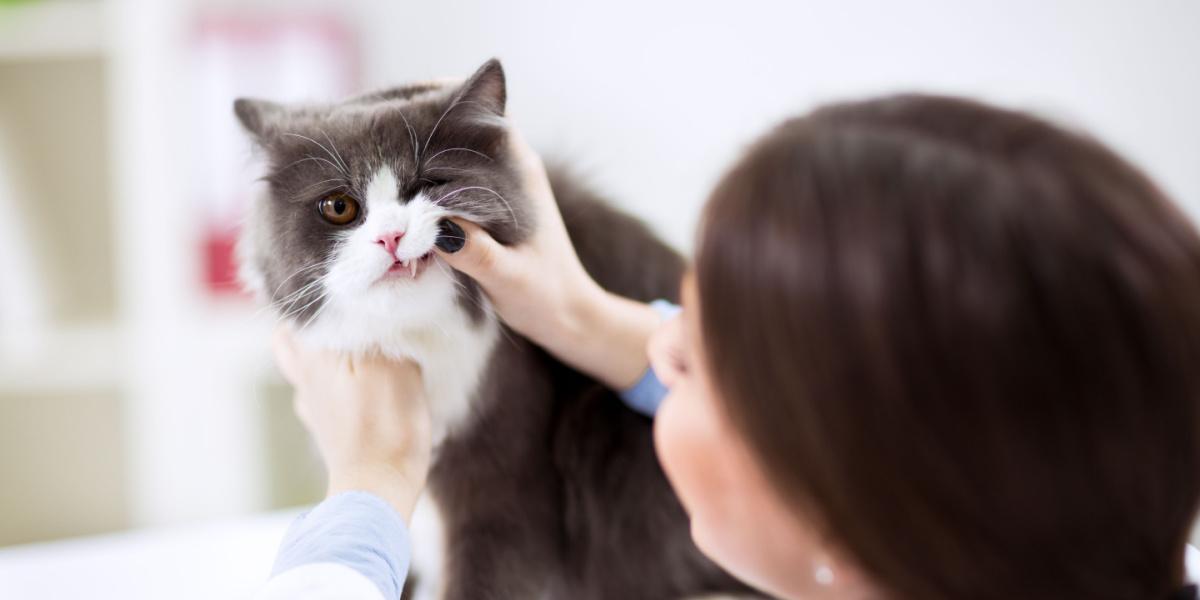
There are many reasons why cats grind their teeth. Most involve mouth pain, but other cases include stress and neurological disease. This behavior shouldn’t be ignored as it’s usually an indicator that something is wrong. Let’s take a closer look at what teeth grinding in cats is, what the causes are, and when you should be worried about your cat’s teeth grinding.
What Is Teeth Grinding?
Cats sometimes grind their teeth, just like humans do. You might see your cat clenching their jaws together and moving the lower jaw from side to side. This often results in a grinding or ‘grating’ sound as the bottom teeth rub against the top teeth. You might notice a clicking sound coming from your pet’s jaw or you might see your cat chattering his teeth.
The medical term for tooth grinding in all species is called bruxism. It is often a sign that your kitty is in some degree of pain. A cat will rarely grind its teeth for no reason.
Regular teeth grinding will lead to abnormal wear of your cat’s teeth, as well as pain in the joint where the lower jaw attaches to the skull, called the temporomandibular joint (TMJ). It is important to identify the cause of your cat’s teeth grinding as quickly as possible to eliminate the source of pain and prevent irreversible damage to your cat’s teeth.
What Are the Causes of Teeth Grinding in Cats?
There are several possible causes of teeth grinding in cats. The most common reasons involve discomfort in the oral cavity and this can stem from many different conditions.
Diseases of the mouth and teeth that can lead to teeth grinding include:
Tooth Resorption
Tooth resorption, also known as feline odontoclastic resorptive lesions (FORLs), affects nearly three-quarters of all cats over 5 years old. It is a painful condition whereby the tooth gradually dissolves, exposing the pulp cavity and leaving the tooth susceptible to breaking. Eventually, the entire tooth can sometimes be lost.
The cause is unknown, but affected teeth can be identified by your veterinarian, although dental x-rays are often needed to make the diagnosis. The affected tooth will need to be removed under general anesthetic which can be a difficult procedure as the tooth is often weak and prone to fracturing.
Gum Disease
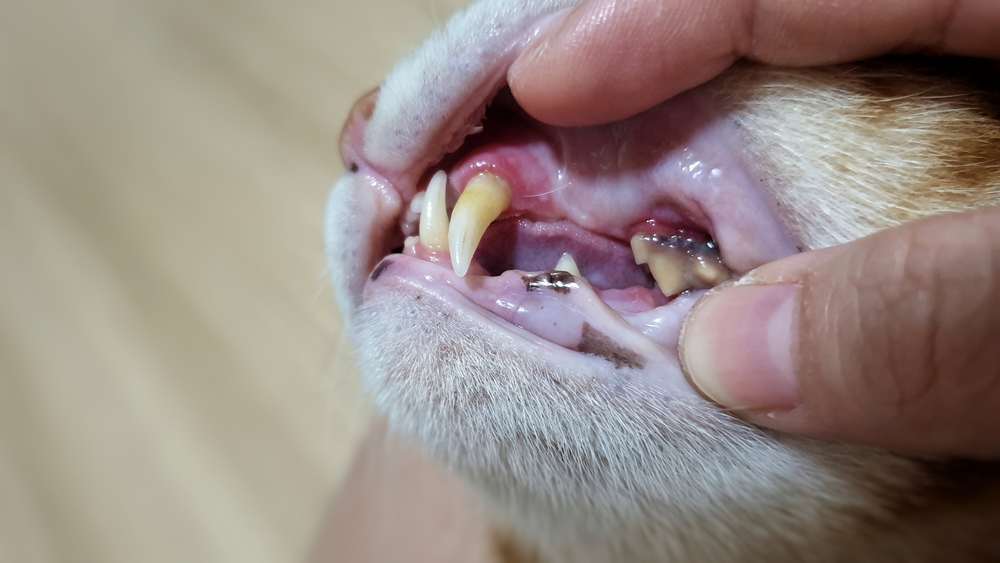
Inflammatory gum disease can be painful for cats, and often progresses quickly.
Inflammation of the gums, otherwise known as gingivitis, can affect cats of any age although it is more common in older cats. Gingivitis is usually caused by bacteria on your cat’s teeth that lead to the build-up of plaque, called periodontal disease. Over time, the gums become progressively more inflamed and the tooth becomes loose in its socket. Eventually, the tooth is lost. Viruses such as feline calicivirus, feline leukemia virus, and feline immunodeficiency virus can also result in gingivitis.
This process is painful and so it is important that gingivitis is identified and treated quickly by your veterinarian. Your cat will usually require a general anesthetic to have their teeth scaled, both above and below the gum line, to remove plaque and tartar. If there are any cavities, loose teeth, or diseased teeth, they will need to be removed at the same time.
Abnormal Alignment of Teeth
Some cats can be born with misaligned teeth, otherwise known as malocclusion. It is more common in brachycephalic breeds of cats that have flatter faces, such as Persians and Himalayans. Malocclusion can also happen in cats with longer, pointy faces such as Siamese. They are prone to their upper canines (fang teeth) pointing too far forward.
Malocclusion can cause difficulty in closing the mouth. It can lead to unintentional teeth grinding as the top and bottom teeth that are out of alignment create friction as they rub against one another. Specific treatment for misaligned teeth needs to be decided by your veterinarian but often involves the removal of certain teeth under general anesthesia.
A Foreign Object Stuck in the Mouth
Cats can sometimes get things stuck in their mouths. This can range from anything such as a piece of bone from a prey animal to a piece of plant material, to a bit of plastic. Older cats can be prone to getting pieces of hair and food stuck between their teeth which can be very uncomfortable.
We’ve all heard the expression ‘curiosity killed the cat’. Their inquisitive nature means that almost anything can become caught in your cat’s mouth. Teeth grinding can occur as your cat tries to shift whatever is stuck.
Loose or Broken Teeth
Dental disease can result in loose or wobbly teeth and this may be painful for your cat, sometimes resulting in bruxism. Occasionally cats can fracture their teeth, either by chewing on something too hard or as a result of a diseased tooth that has become weak. If the fracture exposes the pulp, the tooth becomes very sensitive, and even eating will cause your cat pain, sometimes resulting in teeth grinding.
Fractured Jaw
Cats involved in road traffic accidents can often fracture their jaw. A cat’s jaw is delicate and can sometimes even fracture as a result of severe dental disease that has eroded the bone. Teeth grinding might occur as a result of the pain or as a result of the misalignment of the teeth caused by the jaw fracture.
Cancer
Oral tumors can be a cause of discomfort and may cause bruxism in your cat. Your veterinarian is the best person to be able to give your cat a full oral exam and check for any abnormal lumps.
All of these oral conditions are painful and may also cause other symptoms such as:
- Hypersalivation or drooling
- Pawing at the mouth or face
- Difficulty eating
- Eating on one side of the mouth
- Approaching food as though hungry but then being hesitant to eat
- Loss of appetite
- Swelling around the mouth or cheeks
- Weight loss
- Bad breath (halitosis)
Your cat might show any number of these signs but cats can be extremely good at hiding pain so be sure to observe them carefully.
Other Causes of Teeth Grinding in Cats
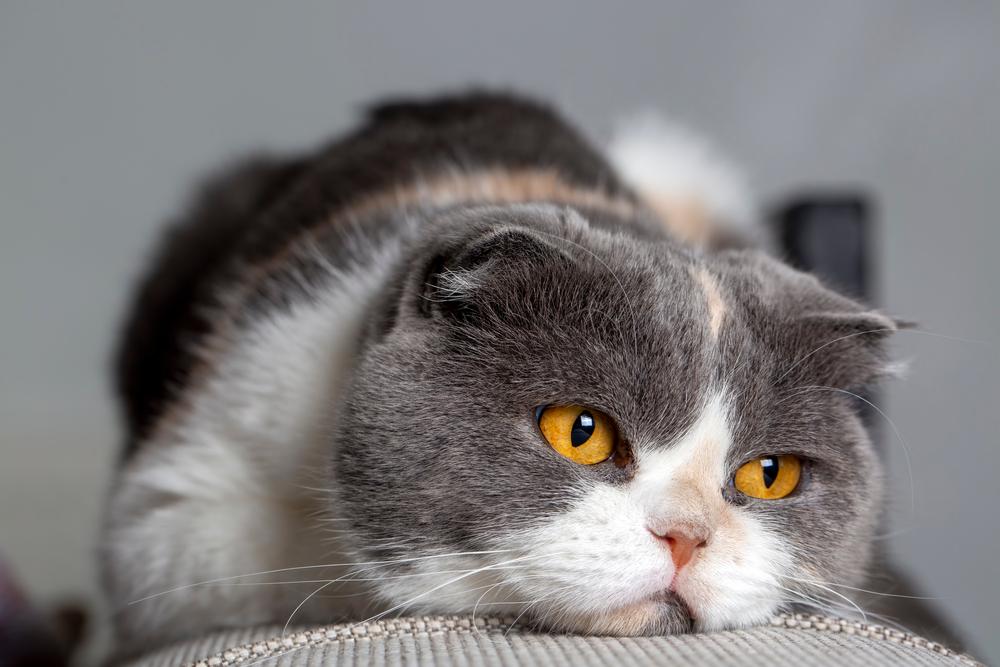
Pain from other areas of the body can cause tooth grinding, alongside other symptoms such as hiding away, lethargy and changes to sleep patterns, grooming and appetite.
Pain
Sometimes, teeth grinding may be a sign that your cat has pain elsewhere in their body. Diseases such as pancreatitis, arthritis, or inflammatory bowel disease can cause pain or discomfort that may result in feline teeth grinding. Almost any painful condition can cause a cat to grit or grind their teeth.
Anxiety
Anxiety or stress is a common problem in pet cats and it can manifest in a number of different ways such as bruxism, overgrooming, or even urinary problems. The cause of a cat’s stress can sometimes be difficult to identify but any change in their routine can result in stress. In these cases, using calming supplements or plug-in pheromone diffusers such as feliway can help to relax your cat and make them feel safe.
Neurological Conditions
Less commonly, neurological conditions such as seizures will cause bruxism in cats. During a classic convulsion, your cat will also likely lose consciousness, paddle their limbs and lose control of their bladder or bowel. However, there are various different types of seizures and some may be more subtle. Speak to your veterinarian if you suspect your cat might have had a seizure.
Diagnosing and Treating Cat Teeth Grinding
Treating your cat’s teeth grinding depends on swift identification of the cause. You should never ignore your cat’s teeth grinding as it almost certainly is a sign of underlying pain or other medical condition. If your veterinarian rules out oral pain as a cause of bruxism, they might suggest blood tests or imaging such as x-rays or ultrasounds to try and identify the underlying cause.
Treatment will depend on the cause, but may often involve dentistry. Loose, broken or resorbed teeth may need removal, and gum disease may require anti-inflammatory or antibiotic treatment. Tooth grinding is often associated with pain, so your cat may be prescribed pain killers whilst the underlying issue is treated.
How to Prevent Teeth Grinding in Cats
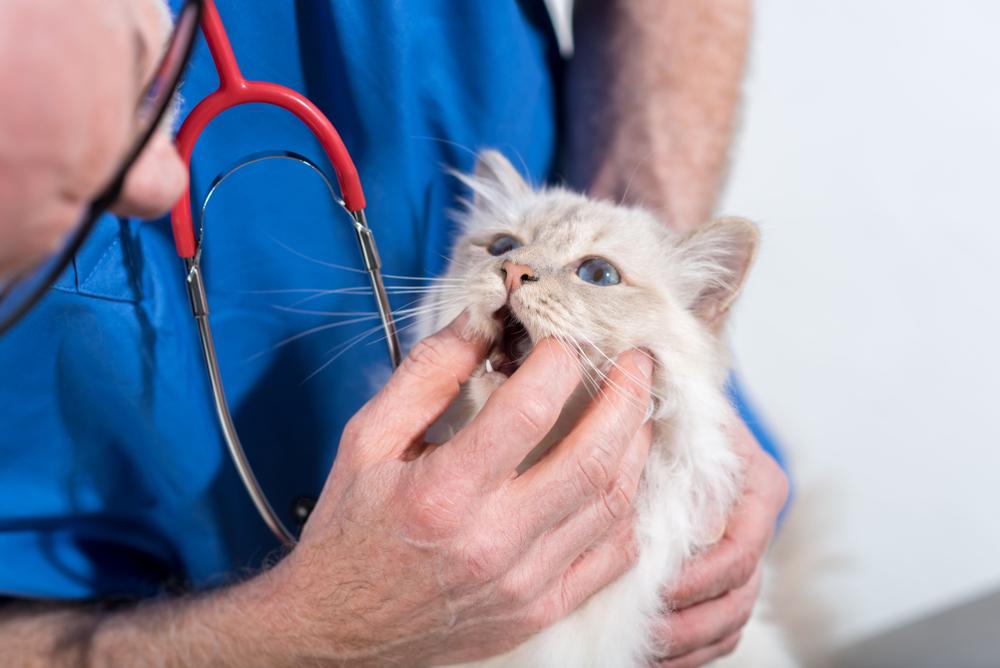
It is recommended for cat owners to engage in an active oral hygiene routine for their pets, to reduce the likelihood of painful dental disease.
The best way to prevent teeth grinding is to look after your cat’s oral health. The best way to do this is by brushing your cat’s teeth once a day. Teeth brushing is best started young but it’s never too late to start! You should start off slowly and gradually and build up to brushing your cat’s teeth.
You should also get your cat’s mouth checked at least annually by a veterinarian so that any problems can be identified quickly. Follow your veterinarian’s advice regarding treatments. This might involve a general anesthetic to have your cat’s teeth professionally cleaned and any problem teeth removed.
Summary
Teeth grinding (bruxism) in cats is always something that should be taken seriously as it most commonly indicates that your cat is in pain. Watch out for any other abnormal behavior or symptoms and take your cat to the veterinarian as soon as possible so that the underlying cause can be investigated and any pain can be treated. The good news is that bruxism is almost always treatable and can often be prevented with good dental care and regular veterinarian check-ups.
Also Read: How To Brush Your Cat’s Teeth
